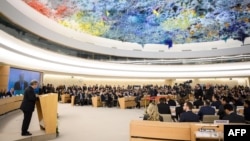U.N. Secretary-General Antonio Guterres warns the erosion of human rights around the world is threatening peace and security and putting restraints on people’s right to development. The secretary-general has opened the 40th regular session of the Human Rights Council.
Guterres said the human rights agenda is losing ground in many parts of the world with negative consequences for social justice and people’s ability to improve their lives.
Among the troubling trends he sees is what he calls the shrinking civic space in every region of the globe and every corner of the Internet.
“Activists and journalists are being targeted by surveillance, misinformation campaigns and threats of violence that too often result in actual violence. Big data and facial recognition technology are being misused for undue surveillance and interference with free speech, causing a chilling effect and a shrinking space for dialogue,” he said.
Guterres said he is alarmed by rising anti-Semitism and anti-Muslim hatred. He says hate speech is a menace to democratic values, social stability and peace. He warned vicious, disparaging verbal attacks are moving into the mainstream, infecting liberal democracies and authoritarian systems alike.
“Some major political parties and leaders are cutting and pasting ideas from the fringes into their own propaganda and electoral campaigns. And, parties once rightly considered pariahs, are gaining influence over governments. And, with each broken norm, the pillars of humanity are weakened,” said the U.N chief.
Over the coming four weeks, the 47-member Human Rights Council will explore many of the issues the U.N. Chief has raised. It will examine the human rights records of countries including Syria, Myanmar, Burundi, South Sudan, Iran and North Korea. It also will deal with thematic issues such as torture, disappearances, terrorism and freedom of religion.
The United States quit the Council last year calling it a politically biased body and a protector of human rights abusers. It can still participate as an observer during the current session.










